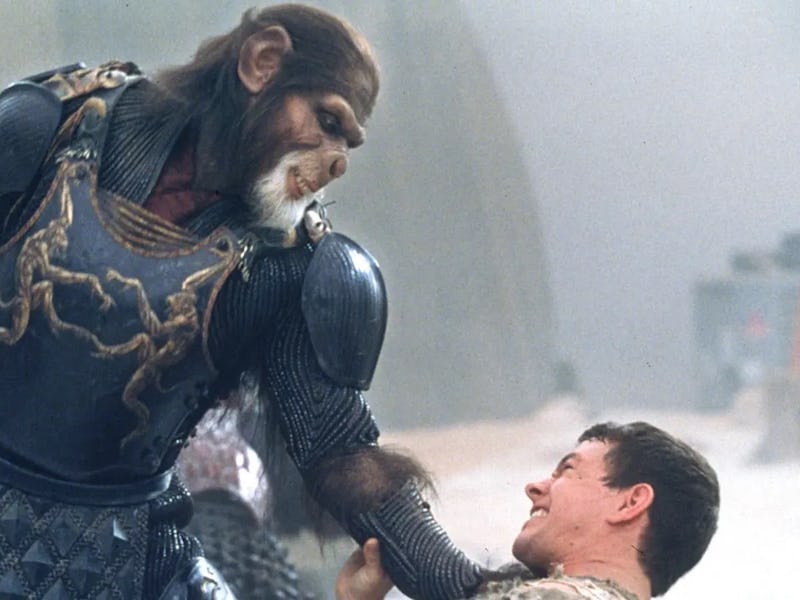23 Years Later, Planet of the Apes Might Subvert Its Own Canon — Again
It was Earth all along... or was it?

The biggest twist of the original 1968 Planet of the Apes was actually very different from the Pierre Boulle novel, and that twist has since determined the direction of every single Apes adaptation, reboot, and sequel. But as the latest trailer for Kingdom of the Planet of the Apes suggests, the best bet for this high-concept planet might be to undo the oldest twist of all time with... the original twist.
During the 2024 Super Bowl, Fox dropped a new trailer for the latest installment of the Apes saga, Kingdom of the Planet of the Apes. As with the previous trailers, there’s a back-to-basics vibe here, as the movie seems to re-tread the familiar aesthetics and plot points of the classic films. Kingdom of the Planet of the Apes takes place at least 300 years after War for the Planet of the Apes, which puts it a bit closer to the far-future timeline of the Earth from the original films, even though the continuity is decidedly different.
However, certain scenes from the new trailer will also remind longtime Apes fans of yet another version of the continuity: the 2001 Tim Buton reboot just called Planet of the Apes. Seeing apes rounding up savage humans in the Kingdom trailer evokes the 1968 original, but there’s also a touch of the 2001 reboot. We also see a new hero ape, Noa (Owen Teague), contemplate a model of the solar system, which seems to touch on the idea that the planet in Planet of the Apes is not always Earth.
In the 2001 Tim Burton reboot, Leo Davidson (Mark Wahlberg) accidentally travels to the planet Ashlar, where apes rule and humans are slaves. This is an obvious change from the 1968 film, in which the twist was that the planet was really Earth in the future. However, the 2001 reboot wasn’t really trying to subvert the 1968 movie so much as restore the status quo of the original novel. In that version of the story, the planet ruled by apes is called Soror, and isn’t meant to be a future version of Earth.
Tim Burton’s reboot was unique in having the setting be an alien world, but the movie was a failure. It’s all vibes and no substance, something the 2011 - 2017 trilogy corrected. But what if Kingdom of the Planet of the Apes brings back the 2001 film’s setting, and accomplishes what Burton couldn’t?
Is the Planet of the Apes not Earth?
Is this movie not set on Earth?
Is Kingdom of the Planet of the Apes actually set on Earth? Everything we know indicates this is meant to be a sequel that continues the canon that began with 2011’s Rise of the Planet of the Apes, which would indicate we’re seeing a far-future Earth. But because Kingdom is also a quasi-reboot, could it retwist the original twist?
In one trailer scene, Noa says, “The elders did not tell us everything about this world.” Notice he doesn’t say “Earth.” Neither the teaser nor the trailer for Kingdom has shown us any architecture specific to Earth. Instead, there’s a generic post-civilization vibe, including old ships and an observatory. We also get several scenes of people looking through the latter’s telescope. What are they seeing? Evidence that this isn’t our solar system?
Three centuries is a long time. If Kingdom is building upon the most recent films, there’s no reason it couldn’t establish an in-between canon, a time when a coalition of apes and humans took to the stars and crash-landed on another planet. Throughout both trailers, there’s a ubiquitous star-symbol seen on both the wrecked ships, and on jewelry worn by the apes. Could this insignia represent a space-faring era that exists in the movie’s backstory?
All in all, Kingdom of the Planet of the Apes represents the third major reboot of the Apes mythos. If it wants to do something new, it may need to play with our assumptions about the basic setting. If this movie did decide to reveal an alien world, it wouldn’t just fix the Tim Burton version; it would restore Pierre Boulle’s original vision, too.